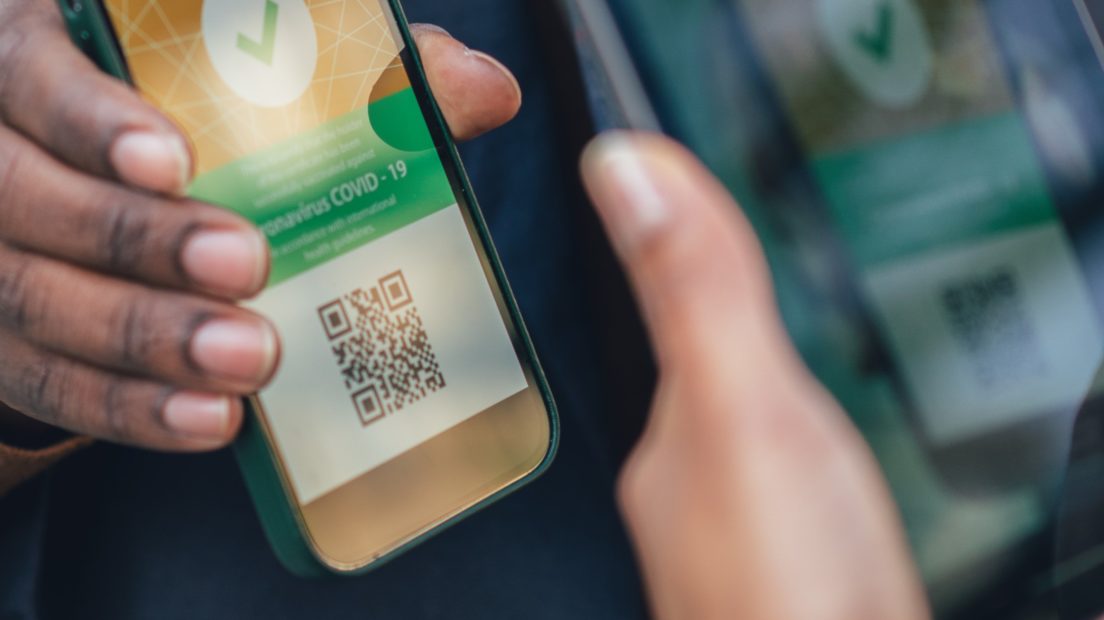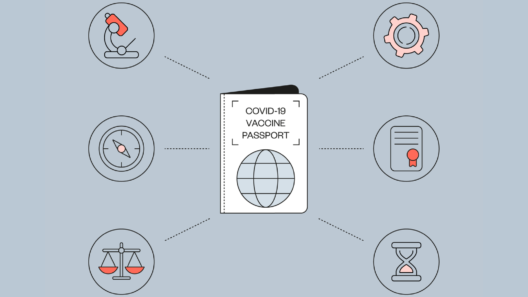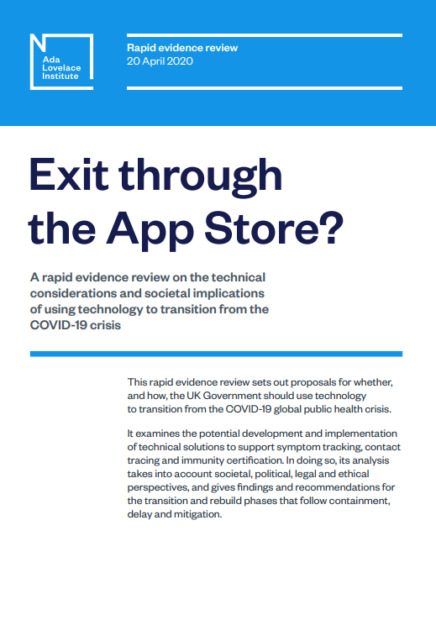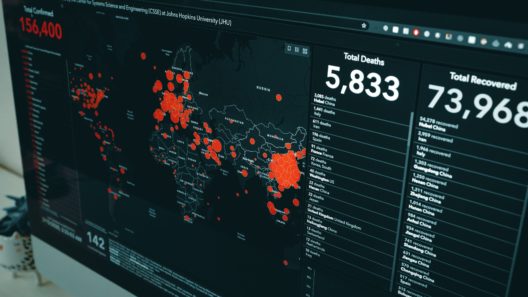Understanding COVID-19 certificates in the context of recent health securitisation trends
What narratives have framed pandemic-related technologies and who do they leave out?
9 March 2023
Reading time: 13 minutes

The COVID-19 pandemic has vastly accelerated the digitalisation of public health practices and given rise to novel pandemic-related technologies. Known by a variety of names, COVID-19 digital certificates are one such tool and, at various points during the pandemic, have been required to access public spaces and travel domestically and internationally.
The growing reliance on digital pandemic technologies has not developed in a vacuum, however. These solutions shape and are shaped by recent trends in public health, including the transition towards health securitisation, i.e. constructing health issues as national security threats. This shift has been especially concerned with preventing infectious diseases (and the associated human, economic, and political costs) from reaching Northern and Western European and North American nations.
To build a nuanced understanding of digital certificates, it is crucial that we study them in the context of these other pertinent developments and the power structures that frame their uses.
Indeed, COVID-19 certificates – including their infrastructure, which may outlast its original aims and be re-purposed – could be used to profile, exclude, discriminate, stigmatise, target and/or surveil, as comparable tools have been utilised in similarly exceptional circumstances. They could foster tiered societies predicated on COVID-19 status and amplify existing inequities. As we can learn from past experience, such amplification is inevitable when health securitisation policies are adopted.
Health securitisation and infectious diseases of pandemic potential
The shift in global health governance towards health securitisation started in the 1990s and early 2000s with attempts to frame the HIV pathogen as a security matter. Largely driven by national economic interests, these narratives centred on the disease’s potential far-reaching effects on global economic output and political stability.
Over the last three decades, this framing has fed a tendency to legitimise pre-emptive forms of control (e.g. border closures, mass quarantines, extensive syndromic surveillance networks that monitor populations for early outbreak detection), which have been potentiated by technological advances, including those enabling COVID-19 certificates.
Meanwhile, securitising trends in general have intensified following the 9/11 terrorist attacks in the United States, the aftermath of which saw the justification of ‘watered-down safeguards for individual privacy’ and an unprecedented classification, compilation and analysis of data in the name of protecting public safety. These efforts have largely targeted marginalised and minoritised individuals and communities (i.e. Muslim populations).
Developments in national security measures have been combined with health security narratives that adopt a state-centric perspective, prioritising the health and wellbeing of a nation over that of individuals or communities, and the interests of certain Western states (i.e. the United States, the United Kingdom, Australia, Canada, Western Europe) in particular. We see these interests reflected in the policies of both national governments and international institutions, like the World Health Organisation (WHO) and the United Nations Security Council, whose health security agendas are dominated by bio-terrorism, HIV/AIDS and acute and severe infectious diseases of epidemic potential.
The effects of these choices illustrate the inherently discriminatory logic underpinning health securitisation and its harmful ramifications. For instance, early warnings of the 2014-2016 Ebola outbreak were largely ignored by the international community, until cases emerged in the United States. Meanwhile, the prioritisation of certain diseases (e.g. HIV/AIDS), while funding for health systems had more broadly declined, penalised the already resource-strapped and highly vulnerable healthcare systems in West Africa, where the outbreak originated.
In his recent book Epidemic Illusions: On the Coloniality of Global Public Health, Eugene Richardson examines how ‘the way the Global North parses epidemics and related phenomena is not a value-neutral act’ but a ‘form of symbolic power.’ He illustrates how the existing system is predatory and perpetuates inequities, by monopolising knowledge production to serve colonial, racist and patriarchal objectives.
Health securitisation narratives fail not only to embrace the perspectives and lived experiences of those in non-Western and low-income countries, but also to address the structural injustices that lead to diseases disproportionately decimating certain communities and not others.
Moreover, in legitimising the use of extraordinary measures that may bypass democratic procedures and other legal constraints, security politics can cause lasting institutional changes that make reactivating security rhetoric and processes easier. This self-reinforcing tendency is dubbed the ‘emergency trap’ of global security’ and there are valid concerns that it might also normalise COVID-19 digital health-related tools, including COVID-19 certificates.
COVID-19 certificates in the United Kingdom and the European Union
Digital COVID-19 certificates are a recent intervention, driven by the COVID-19 crisis and made possible by advancements in secure digital credentialling technology.
Proposals for digital COVID-19 credentials first surfaced shortly after the WHO declared COVID-19 a pandemic in March 2020. Numerous ideas have been proffered since, exploring a variety of emerging technologies, such as QR codes, facial recognition software and blockchain.[1]
From the beginning of the pandemic,[2] narratives in favour of certification initiatives concentrated on the importance of such measures to stimulate the economy and reopen borders – an argument that resonates with the health-securitisation framing of the HIV pathogen.
Israel launched the first digital COVID-19 certificate in February 2021. China, Bahrain and Japan soon followed. In May 2021 the National Health Service (NHS) COVID Pass was unveiled in England and Wales. A month later, the EU’s Digital COVID-19 Certificate (EUDCC), or ‘Green Pass’, went live to facilitate travel within the Schengen Area.
The ‘Green Pass’ – available only to EU citizens, their family members and non-EU nationals who are legally registered in a member state and have the right to travel to other member states – offers a common gateway for the various credentialling applications that have emerged throughout the EU bloc, enabling the use of different certificate signatures across the Union.
The speed at which these credentialing initiatives have been implemented has not only incited doubts as to whether certain standards (e.g. privacy-preserving) have been met and sufficient ethical reflection carried out, but also exemplified the kind of extraordinary measures enabled by the current health-securitisation paradigm.
Some regard COVID-19 certificates as necessary, if we are to contain this novel disease, minimise its economic effects and return to life as ‘normal’. These arguments tend to view the certificates as a measured response to the crisis and often present them as alternatives to more restrictive preventative policies, like quarantines, school/business closures and stay-at-home orders.
However, various thought-leaders, such as the WHO and the Nuffield Council on Bioethics, have objected to the use of digital COVID-19 certificates due to concerns around equity, ethics and scientific feasibility and accuracy. The latter point has become particularly salient as we have learned more about the virus’s mutability and capacity to ‘evade immunity’, as well as the limited impact of vaccination on transmissibility.
Several in this camp also contend that the passes violate fundamental rights (i.e. privacy, free movement) and lay the ground for the unfair persecution of marginalised and minoritised groups, in line with the discriminatory practices we have seen perpetuated in the context of health security agendas. Authorities in the Chinese province of Henan, for example, utilised the Alipay Health Code mobile application – a COVID-19 certificate – to restrict the movements of some residents following protests.
Another fear is that COVID-19 certificates could limit the mobility of people unable to obtain vaccination due to vaccine nationalism and/or vaccine inequalities that disproportionately affect socially disadvantaged groups (e.g. refugees, asylum-seekers or minority ethnic groups).
Vaccine nationalism, which refers to the hoarding of vaccine supplies by wealthy countries –many of whom are also setting the health securitisation agenda – has led to nations like the United Kingdom and Canada securing orders for more than five and nine doses per person respectively, while only one of the world’s 29 poorest nations, Guinea, had received vaccines.
Similarly, those in low- and-middle-income countries may be further constrained by which vaccines they have access to, and whether these are recognised by international authorities. In the EU, member states are only required to accept certificates for the seven[3] vaccines granted EU marketing authorisation, when waiving free movement restrictions. This has left other nations rushing to implement vaccination and certificate programmes that meet EU standards so that their citizens can travel to the bloc to work, study, etc.
Moreover, political parties in several European countries (e.g. the UK, Italy, Spain, Greece, France, Germany) have exploited the pandemic crisis to promote xenophobic, racist, antisemitic, and ultra-nationalist agendas; a fact which has heightened concerns around how COVID-19 certificates can be utilised to securitise borders.
Finally, even for countries with more robust vaccination programmes, rollouts have been unequal. In the UK, for example, the proportion of people 18 years or older who were unvaccinated as of October 2022 was highest and lowest for those in the Black Caribbean (39.5%) and White British (8.8%) ethnic groups respectively. Adults who identified with at least one of the following statements were also more likely to be unvaccinated: living in more deprived areas, urban areas or social rented housing; were not born in the UK or did not have English as a main language; are limited a lot by a disability; list their religious affiliation as Muslim or ‘Other’; have never worked or are long-term unemployed.
These statistics are not unexpected considering how, in nations like the UK, evidence indicates that systematic racism and discriminatory healthcare access have eroded trust in science and medicine among minority groups and fuelled vaccine hesitancy. Additionally, evidence suggests that individuals from these groups are more likely to experience practical restraints to vaccination – including lack of transportation, affordable childcare, unpaid time off work and access to internet connection or other technology necessary to make online appointments.
Mitigation measures and moving forward
Documenting people’s COVID-19 statuses has the very real potential of reinforcing racial prejudices by predicating discrimination on a form of immunity that is uncertain, complex and short-lived.[4]
Throughout history, immunological bias has not only compounded discriminatory rhetoric and practices, but has been weaponised to justify inequities. This was the case, for instance, in antebellum New Orleans, where recurring epidemics of yellow fever further stratified a deeply unequal society. White individuals who survived could leverage their immunity, which they strived to verify through documentation (i.e. physician’s letter, proof of local birth, references from tropically based employers) to gain wealth, standing and power.
As Professor Kathryn Olivarius eloquently summarises, ‘any disease to which humans can gain immunity or resistance through exposure or vaccination can open new pathways for thinking about hierarchy, power and capital.’
Moving forward, we must meaningfully engage marginalised and minoritised perspectives on public health policy in both regular and exceptional circumstances, as their experiences are crucial to cultivating a more nuanced understanding of how COVID-19 certificates relate to access and power.
For instance, some past proposals have suggested that COVID-19 certificates are only utilised to limit access to non-essential spaces, like gyms, bars, restaurants, theatres, hotels or music venues. These constraints, however, could not only intensify social isolation, but severely curtail vital networking opportunities for those whose professional development depends on such access.
If we are to design tools that redress present inequities, we need to go beyond using privacy-preserving technologies and methods (e.g. decentralisation) or offering easily accessible non-digital alternatives — although these are necessary. We must employ practices that address harms caused by algorithmic bias as they materialise in sociotechnical systems, such as those used to manage infectious disease outbreaks. Algorithmic reparations, which explicitly considers structural inequalities (e.g. racism, sexism) and addresses shortcomings in current algorithmic fairness practice by unmasking and undoing algorithmic harm, is one such approach.
To do this, we must be flexible, so that digital certificates can be adjusted and, when necessary, dismantled. This reflection is vital to containing the effects of securitisation and avoiding the emergency trap of exceptional politics. Plans in Hangzhou, China, to expand the Alipay Health Code app into an integrated health platform that supplies each resident with a personal health index score illustrate the dystopian turn these credentialing tools could take.
Any digital certificate efforts, however, are remiss without complementary community-based outreach initiatives. These should prioritise tackling misinformation, misplaced blame, hate speech and other racist, xenophobic rhetoric and activities and fostering access to and uptake of safe, culturally acceptable vaccines – particularly within communities that have been systemically excluded, disinvested in and/or placed at-risk, both domestically and abroad.
Finally, digital certificate systems must be carefully designed and deployed so that they do not intensify vaccine inequities. The expansion of the EUDCC system to 49 non-EU countries and territories is an important step in this direction. As a result of this scheme, COVID-19 certificates issued in any of these 49 entities are accepted under the same conditions as the EUDCC. Progressing on this extension, however, necessitates a public health agenda that protects all, not just those living in the wealthiest nations.
A cautionary conclusion
Vaccines have the potential to avoid significant health, human and socioeconomic losses. And while digital status certificates have largely been curtailed and/or discarded, there are still prominent voices arguing in favour of such tools – especially in light of China’s recent COVID-19 wave. This has prompted new COVID-19 rules on travellers from China, as well as a fresh surge of headlines perpetuating bio-securitisation (and xenophobic) rhetoric centred around ‘protecting’ national populations.
With a recent report by the European Court of Auditors praising the effectiveness of vaccine certificates in the EU, it is not outside the realm of possibility that they will experience a resurgence. Even if this is not the case, the pandemic is far from over, meaning that we can expect to see other pandemic-related digital tools gain prominence. When discussing how these devices and mechanisms ‘keep the public safe,’ we must adopt a critical lens to look at the over securitisation of global health and ask: which public? What narratives accompany these tools? And how do social, economic and political power flow through these systems?
This blog post was commissioned in the context of our Health Data and COVID-19 technology research programme.
If you want to know more about the risks and benefits of vaccine passports, you may be interested in our previous work ‘Checkpoints for vaccine passports’.
[1] While most certification schemes have been initiated at the national level by government officials, some have been proposed by private actors (e.g. IBM’s digital health pass and the International Air Travel Association’s (IATA) Travel Pass).
[2] The stated objectives of early plans centred around documenting immunity acquired through infection, thus earning the name of ‘immunity passes’. As vaccination programmes started rolling out, the conversation around COVID-19 certificates shifted and vaccination verification became the focus.
[3] Yet worldwide over 100 vaccine candidates are in/have completed human trials.
[4] The fact that it is unclear whether (a) immunity is long-lasting and protective and (b) the pathogen mutates slowly enough for immunity to work against most strains has led some to conclude that COVID-19 status certificates are currently impractical and unethical.
Related content

Vaccine passports and COVID-19 status apps
An evidence review and expert deliberation of the practical and ethical issues around digital vaccine passports and COVID-19 status apps.

Checkpoints for vaccine passports
Requirements that governments and developers will need to deliver in order for any vaccine passport system to deliver societal benefit

Exit through the App Store? Rapid evidence review
Our report has been influential in informing the policy response to using data-driven technologies to exit from COVID-19 emergency lockdown measures.

COVID-19: How public health emergencies have been repurposed as security threats
Shedding light on the capacity of technology to trace and monitor the movement of individuals.